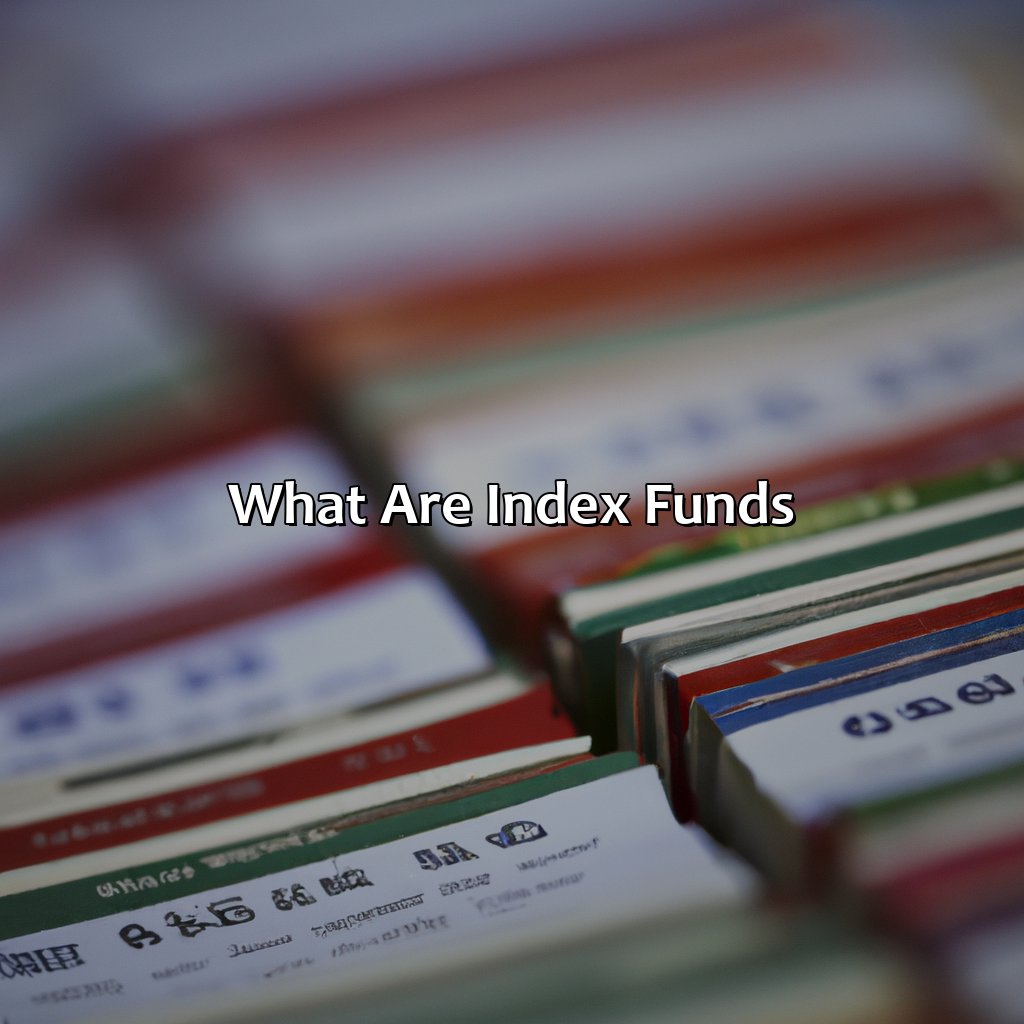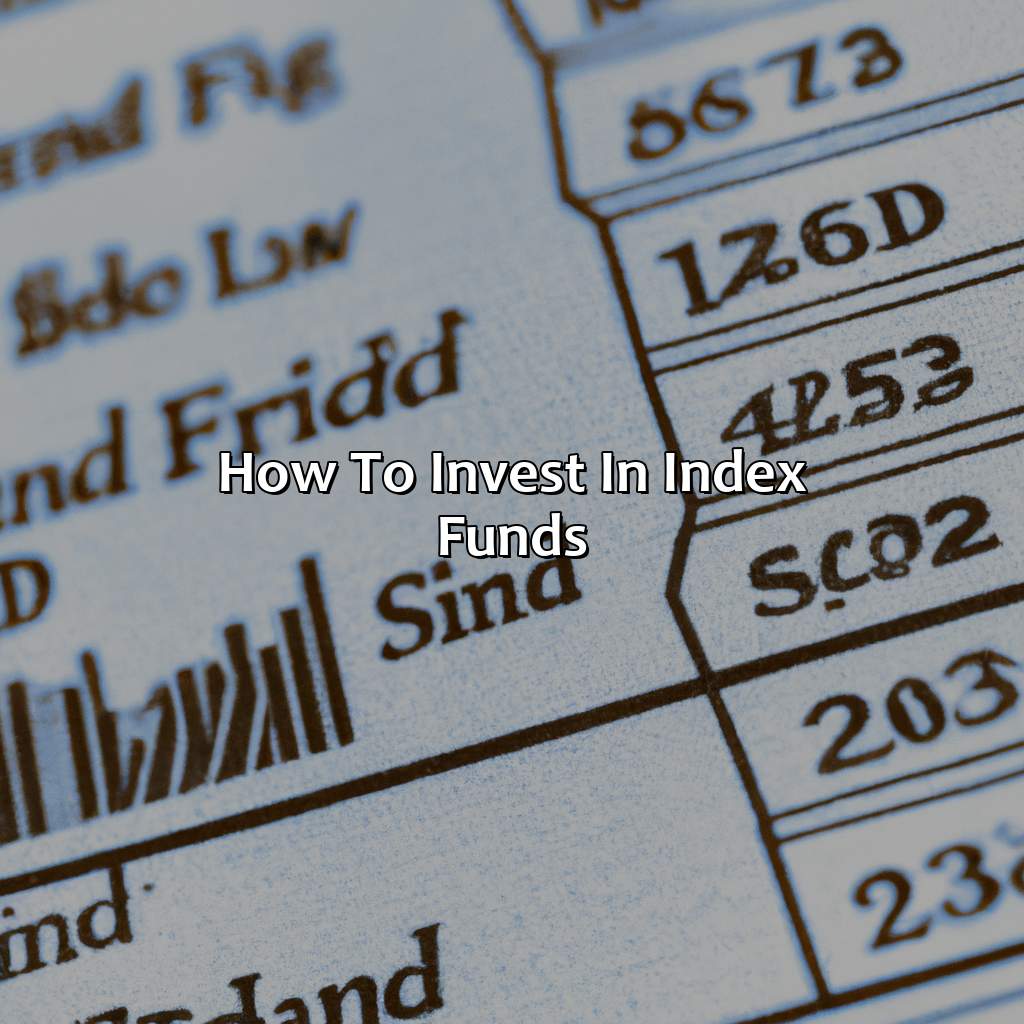Why Is Index Funds A Good Investment?
Key Takeaway:
- Index funds offer a low-cost investment option: With lower fees than actively managed funds, index funds allow investors to keep more of their returns.
- Investing in index funds provides diversification: By investing in a range of companies through an index fund, investors can reduce their risk and avoid putting all their eggs in one basket.
- Index funds have consistently performed well: While they don’t offer the same high returns as individual stocks, index funds have historically produced steady, reliable returns for investors over the long-term.
Are you curious to know the advantages of index funds? This article will explain why investing in index funds is a smart choice for a successful financial portfolio. You will discover the key benefits, and why investing in index funds is likely to pay off in the long run.
What are index funds?
Index funds are a type of mutual fund that tracks a specific market index. They invest in a diversified portfolio of stocks and aim to replicate the performance of the underlying index. These funds are passively managed, meaning they require minimal human intervention and operate with lower expenses. The attractiveness of index funds lies in their simplicity, low fees, and smooth diversification across different market segments. Their performance has historically been consistent with the overall performance of the market index they track, which can provide investors with long-term returns. Overall, index funds are a reliable investment option for those who seek a low-cost, stable, and diverse approach to investing.
As mentioned before, index funds are designed to track specific market indexes’ performance. They achieve this by investing in the same stocks of the underlying index, with the same weighting as the index. An example of such a market index is the S&P 500, which comprises 500 of the most prominent US companies. Similarly, index funds that track the S&P 500 will hold a proportional stake in each of these companies. The passive nature of index funds means there is minimal input from fund managers, resulting in reduced expenses and improved efficiencies.
Moreover, index funds present numerous benefits to investors, such as the simplicity of their design, which means they can be easily understood and accessed by novice investors. Additionally, index funds provide a low-cost alternative to actively-managed funds. Index funds charge lower fees because they operate passively and have fewer management expenses. Finally, index funds can provide a diversified portfolio, minimizing investors’ exposure to individual security risk, and spread their investment across a broad range of sectors.
Pro tip: Before investing in index funds, be mindful of any specific risks or market volatility that may impact the returns. Consider diversifying your portfolio within the index fund space and not limiting all investments in one index.

Image credits: retiregenz.com by James Washington
Advantages of investing in index funds
Glean the perks of index funds with low costs, diversification, and consistent returns. Low costs help boost profits. Diversification reduces risks. Plus, steady returns ensure regular income over time. Check out this section to find out more about how index funds can benefit your investment portfolio.

Image credits: retiregenz.com by Adam Arnold
Low expenses
As a smart investor, you know that investing in funds with low expenses is critical to increasing your overall returns. Luckily, index funds can offer this benefit and more. By selecting a diverse range of stocks included in a specific market or sector index, index funds minimize management fees and other related costs, allowing investors to receive higher returns on their investments.
In addition to low expenses, index funds offer considerable diversification benefits by holding a broad portfolio of stocks as opposed to individual stocks which can be risky if the stock falls. This diversified approach affords you protection from market volatility and allows for higher potential returns over time.
One unique feature of index funds is their flexibility in being able to be bought or sold at any point during the day since they are passively managed. This makes them appealing for both new and experienced investors looking for more control over their investments.
Don’t miss out on the potential returns of investing in an index fund with low expenses. Make sure you take advantage of these benefits and invest wisely to maximize your gains. Putting all your eggs in one basket is risky business, unless you’re a chicken farmer.
Diversification
Investing in index funds is an excellent way to achieve portfolio diversification. Diversification is a strategy used to balance risk by investing in a variety of asset classes. It reduces the impact of market volatility on your portfolio.
Index funds provide diversification by tracking a wide range of stocks, sectors, and markets. By investing in an index fund, you are investing in the entire market or sector rather than individual companies. This provides you with exposure to various industries and geographies that can be difficult to replicate yourself.
Not only does diversification reduce risk, but it also improves returns over time. Index funds have low fees compared to actively managed funds; this means you keep more of your returns. Additionally, because index funds track entire indices, they tend to outperform actively managed funds in the long term.
One suggestion for maximizing diversification is to invest in multiple index funds across different asset classes and market sectors. Another suggestion is to regularly rebalance your portfolio by selling assets that have become too large a proportion of your holdings and investing in underrepresented areas.
“Index funds: Because making consistently good investment choices is harder than naming a Kardashian baby.”
Consistent returns
Investing in index funds can provide a reliable and steady stream of returns. These returns are consistent and predictable, making them an attractive option for investors seeking long-term financial security. By diversifying across various stocks and sectors, index funds mitigate the risks associated with individual stock picking.
Moreover, Index fund managers use passive management strategies that require less human input and therefore are cost-effective compared to actively managed funds. It also ensures consistency as the fund is constructed based on a pre-determined set of rules or benchmark.
Index Funds also allow for easy liquidity, meaning you can quickly buy or sell your shares at any time during trading hours through different brokerage firms or online platforms. Lastly, because they track the broader market movement rather than individual company performance, they offer a hands-off approach to investing, reducing anxiety caused by market volatility-ideal for investors who lack time and expertise.
Overall, choosing index funds can significantly benefit your portfolio in the long run, especially if you take a diversified strategy across different sectors while continuously monitoring your investments.
Get ready to invest in index funds, because now even a potato can do it with just a few clicks.
How to invest in index funds
Investing in index funds is a piece of cake! Pick a fund that matches your goals, establish an account, and keep adding to it. “Why is index funds a good investment?” is the article to consult. It contains 3 sections to help you decide which is the best investment for you.

Image credits: retiregenz.com by Adam Jones
Choosing the right index fund
Index funds are known for their popularity and the benefits they offer. To make the most of investing in index funds, investors must choose wisely. The ideal way to select an appropriate index fund is by analyzing various factors that affect performance. For instance, overall expense ratio, portfolio assets, and tracking error.
Expense ratios are critical when choosing index funds. The lower the cost of investing in an index fund, the better it is for investors as more investment will go towards returns. Portfolio assets also play a significant role while choosing an index fund as a larger well-diversified portfolio reduces risk exposure. Tracking errors refer to how closely a fund mimics its benchmark; hence, a lower tracking error should be preferred.
Apart from these factors, one should consider other crucial aspects such as past performance and volatility. Analyzing long-term performance helps understand a fund’s stability over time, while volatility measures fluctuations in returns. Overall, selecting the right index fund depends on an investor’s financial goals and appetite for risk.
Pro Tip: Always review different types of index funds before deciding on one to invest in to ensure it aligns with your investment objectives.
Why bother with a savings account when you can set up an investment account and actually watch your money grow?
Setting up an investment account
To begin investing, the first step would be to create an investment account. Opening an app or digital wallet fits the bill, as it allows you to customize and track your portfolio. It also helps you to monitor purchases with utmost accuracy.
Here is a 6-Step Guide to help you Setting up an investment account:
- Choose a Broker: Select a brokerage that suits your needs, easy-to-use interfaces or communities.
- Provide Identification documents: Passport or driving licenses can serve as identity proofs for registration purposes
- Complete Registration Form: Provide comprehensive personal information during registration, providing fullnames and appropriate residential address.
- Select Account Type: You can choose either a self-directed account where you manage your preferred investments activity or prefer advisory-managed portfolios
- Fund Your Account: Deposit cash into your account using different payment methods available for transfer, through automated clearing houses, wire transfer etc.
- Begin Investing: Start investing by selecting index funds that match your financial goals.
It is important to note that the fees associated with buying and selling stocks differ among brokerages. This means doing thorough research before creating an investment account is essential.
Looking at history, many individuals had limited options when trying to start investing their money. Traditional brokers were expensive, only prioritizing those who invested large sums of money in blue-chip stocks. Online brokers have created new opportunities for individuals to invest regardless of their financial capacity; this has allowed easier access to investment accounts for all who wish to participate in building wealth over time.
Regularly adding to your portfolio.
Regularly contributing to your investment portfolio is a vital strategy to enhancing long-term financial growth. Adding funds consistently helps maximize potential returns, balance risk, and comforts volatility. A well-diversified portfolio offers investors a chance to exploit different market conditions while minimizing losses during downturns.
The key to growth investing is the discipline of regularly adding funds, regardless of market conditions. Investing in low-cost index funds can provide convenience, simplicity, diversification, and ease of management. Dedicate automatic contributions from your salary or savings deposit to a broad range of index fund options that reflect your risk tolerance and long-term investment goals.
Investors who stay committed to allocating more funds on a regular basis often achieve better returns than those who focus on timing the market. By automating investments and maintaining a disciplined approach, you can build wealth over time while reducing stress related to recessions or economic downturns.
Adding regularly to an index fund portfolio enables compounding benefits that capitalize on gains achieved over time. As fund performance increases each year, profits are added back into the investments. This process amplifies earnings as time passes and capitalizes on compounding benefits, which increase as balances grow.
One successful investor shared that she has been setting aside the same amount of money every month for nearly two decades into a globally diversified equity index fund. Today her investment is worth multiple times her original contribution due to regular contributions’ compounded impact from both earning profit boosts in up markets and buying cheap shares in down markets.
Five Facts About Why Index Funds are a Good Investment:
- ✅ Index funds provide diversification across a whole market or sector, reducing risk and increasing long-term gains. (Source: Investopedia)
- ✅ Index funds typically have lower fees than actively managed funds, which can significantly impact investment returns over time. (Source: Forbes)
- ✅ Index funds are highly transparent, allowing investors to easily track the performance of the underlying index. (Source: Bankrate)
- ✅ Index funds are easy to buy and sell, providing investors with liquidity and flexibility in their investment choices. (Source: NerdWallet)
- ✅ Research has shown that index funds outperform active managers over the long-term, making them a smart choice for investors looking to build their wealth over time. (Source: The Balance)
FAQs about Why Is Index Funds A Good Investment?
Why is investing in index funds a good choice?
Index funds are a great investment option because they offer diversification, lower fees compared to managed funds, and better long-term returns.
What is an index fund?
An index fund is a type of mutual fund or exchange-traded fund (ETF) that tracks a specific index, such as the S&P 500, by holding the same stocks in the same proportion as the index.
How do index funds differ from actively managed funds?
Index funds differ from actively managed funds in that they are passively managed and aim to replicate the performance of the index it tracks. On the other hand, actively managed funds attempt to outperform the market by using a range of investment techniques.
What are the advantages of index funds over individual stock picking?
Index funds offer numerous advantages over individual stock picking, including diversification, lower risk, and lower fees. With index funds, you can invest in many stocks at once, which significantly reduces your exposure to individual stock risk.
What are the fees involved with investing in index funds?
Index funds have lower fees compared to actively managed funds because they require less expertise and research. Fees can vary depending on the fund, but they are usually much lower than the fees of actively managed funds.
Can anyone invest in index funds?
Yes, anyone can invest in index funds. They are available to retail investors and institutional investors alike. Many brokerage firms offer index funds as an investment option, and individuals can even invest in index funds through their employer-sponsored retirement plans.
